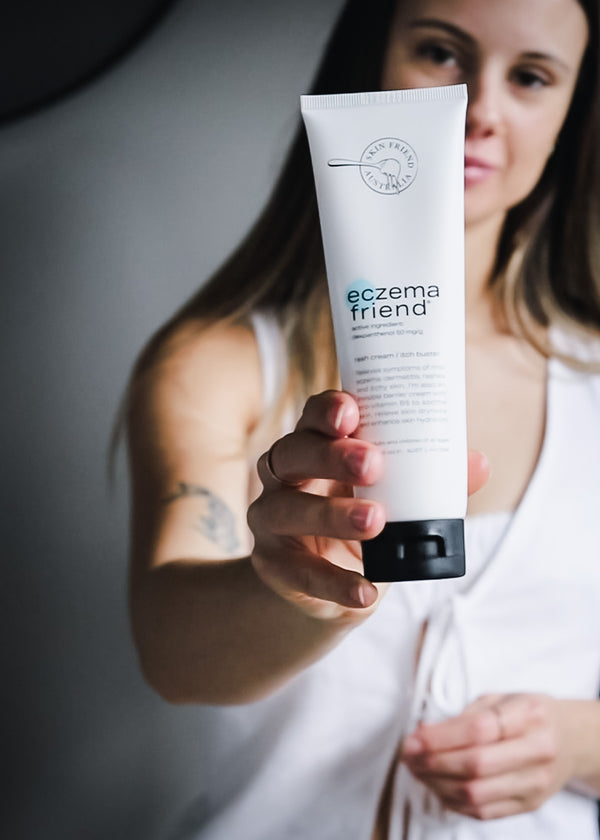
Eczema Around the Face and Scalp
If you’ve ever experienced eczema on the face, you’ll know it can be incredibly sore, itchy and deeply frustrating.
Eczema/atopic dermatitis can show up on the face in a number of ways – it may resemble dandruff on the face and eyebrows, dryness and flaking around the mouth and cheeks, crusting and flaking on the scalp, or even as seasonal eczema flare-ups.
Nutritionist Karen Fischer, founder of Skin Friend, has worked with eczema patients for over two decades so her gentle, science-driven skincare and supplements are designed to support and restore the skin barrier – without harsh additives, fragrance or steroids.
The goal for managing and preventing eczema is to keep skin calm, comfortable and hydrated, while preventing nutritional deficiencies to strengthen skin from the inside out. At Skin Friend, we believe that healthy, glowing skin starts with a strong skin barrier and good nutrition, because your skin is made from the foods you eat.

Different Types of Eczema on the Face
Facial eczema happens when the skin barrier is compromised, allowing moisture to escape and irritants to enter. This may lead to food allergies and intolerances, redness, dryness, flaking and itching.
Because facial skin is thinner and more exposed than other areas, it’s often more sensitive to environmental and lifestyle triggers such as temperature changes, harsh skincare products, soaps, stress and poor food choices.
Dandruff on the Face and Eyebrows
If you’ve noticed flaking, crusting or dryness in your eyebrows, along your hairline, or around the sides of your nose, you may be experiencing seborrhoeic dermatitis.
While not the same as eczema, it can occur alongside it and is often triggered by changes in skin oils which is a sign of nutritional deficiencies (more on this shortly), an overgrowth of skin yeasts (caused by poor skincare choices) and even environmental stressors.
Seasonal Eczema on the Face
Some people find their facial eczema changes with the seasons:
- In winter, cold air and indoor heating draw moisture from the skin, often leading to cracking, redness and tightness.
- In summer, heat, sweat and sunscreen sensitivities can increase the risk of flare-ups.
If you experience seasonal eczema on the face, adjusting your skincare routine to keep the skin barrier strong year-round can help reduce the frequency and severity of flare-ups.

What Triggers Eczema on the Face?
Everyone’s skin is unique, and what sparks a flare-up for one person may not affect another, but having worked with eczema patients for more than 20 years, Karen has seen some patterns emerge. Eczema on the face can be influenced by a mix of lifestyle and internal factors – sometimes in combination.
Common triggers include:
- Sudden changes in temperature or humidity – if you are deficient in calcium then your skin may not respond properly to weather extremes as calcium trigger the skin barrier to thicken (for added protection) in dry, harsh weather
- Fragrance skincare, soaps makeup, or cleansers, as they usually have the wrong pH for healthy skin
- Sensitivities to chemical sunscreens, especially spray sunscreens that may be accidentally inhaled, and non-mineral sunscreens
- Sweat and heat
- Stress and poor sleep
- Nutritional deficiencies
- Salicylate or histamine intolerance
- Intolerance/allergies to dairy, hen’s egg, wheat, peanut and soy are common according to research
How to Care for Eczema on the Face
1. Gentle Cleansing: Choose a pH-balanced, fragrance-free cleanser to remove impurities without stripping your skin’s natural oils. Check your skincare products and avoid these ingredients:
Sodium lauryl sulfate (SLS) – harsh/irritating for sensitive skin.
Sodium laureth sulfate (SLES) – milder than SLS, but still irritating on eczema
Fragrance/parfum – disrupts hormones and common irritants that should be avoided topically
Cocamidopropyl betaine (CAPB) – this common surfactant can be found in most cleansers, but it was named “allergen of the year” in 2004
Benzyl alcohol – can sting or burn broken/eczema-prone skin
Ethanol/denatured alcohol – very drying, damages barrier and worsens itch
Formaldehyde-releasing preservatives (e.g. DMDM hydantoin, Quaternium-15) – sensitizers and eczema triggers
Propylene glycol (high concentrations) – frequent contact allergen, can irritate eczema-prone skin
Avoid cleansers with the wrong pH – according to research, healthy skin has a pH below 5 so all cleansers should have a pH in between 4.0 and 5.0 so this protective acid mantle is not disrupted. A higher pH (around or above 6.0) can cause the skin’s protective microbiota to dislodge, which makes it easier for staph infections to proliferate.
2. Daily Moisturising: Hydrate morning and night with non-irritating eczema creams formulated to help reinforce the skin barrier, like our Wonder Zinc and Eczema Friend creams. Eczema Friend also provides the correct pH (around 4.6) to support microbiome health. So if you use the wrong cleanser, Eczema Friend can help provide a restorative pH for your skin.
3. Barrier Support: Take supplements with ingredients like zinc and nicotinamide (vitamin B3) to support skin and gut health (click here for Karen’s recommendation).
4. Sun Protection: Opt for mineral-based sunscreens containing zinc oxide – as it’s a gentler option for sensitive skin.
5. Internal Support: Nourish your skin from within with vitamins and minerals that support barrier integrity, hydration balance and overall skin health.

How Skin Friend Can Help
At Skin Friend, we create kind, calming and skin-friendly products for eczema on the face (and other areas too).
Topical Treatments
- Wonder Zinc: An award-winning zinc oxide and provitamin B5 cream that provides a breathable skin barrier shield while helping to calm visible irritation.
- Eczema Friend: Steroid-free eczema cream with provitamin B5 to soothe skin and relieve mild eczema and dermatitis, while providing hydration.
- 24-Hour Rescue: Rich, non-greasy moisturiser that delivers all-day comfort for dry, sensitive skin. Use this to maintain your results and prevent flareups from returning.
Skin-Loving Supplements
Our vitamins that help eczema are filled with nutrients that can assist in maintaining healthy skin from the inside out.
These include zinc to assist the repair of the gut wall lining and support immune system health, vitamin C to support collagen production and magnesium and calcium to support healthy sleeping patterns and muscle relaxation.
- Skin Friend AM: Morning blend of zinc, vitamin C and activated (methylated) B vitamins to support energy levels, skin health and collagen formation.
- Skin Friend PM: Your afternoon ”cup of calm” with magnesium and calcium to support healthy sleeping patterns, skin health and muscle relaxation.

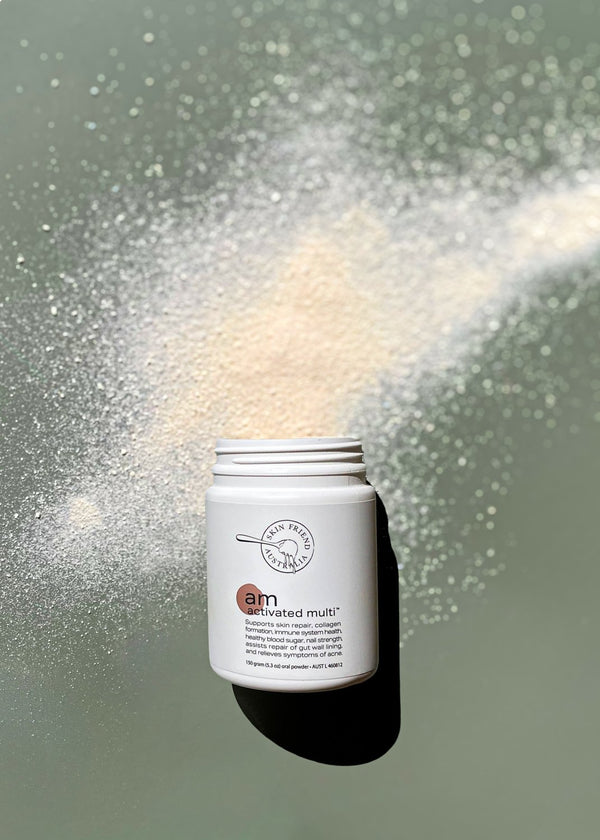
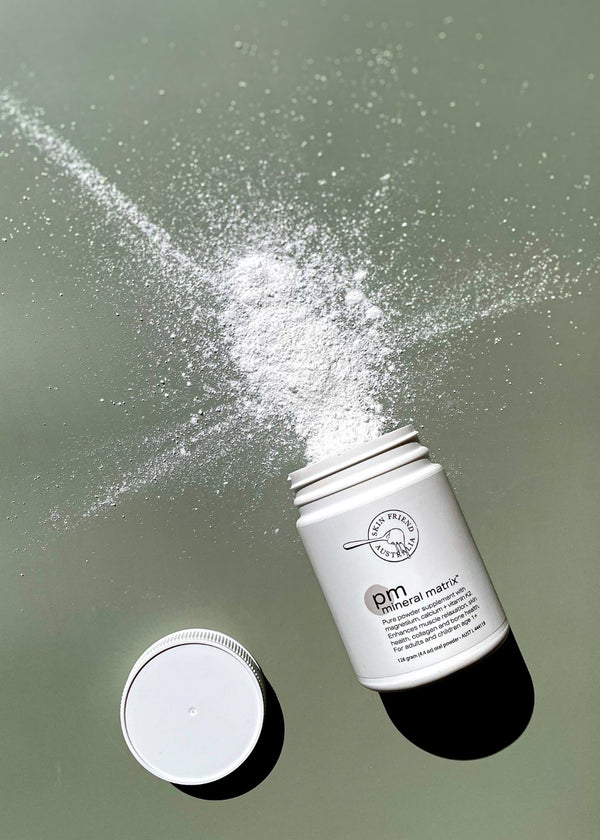
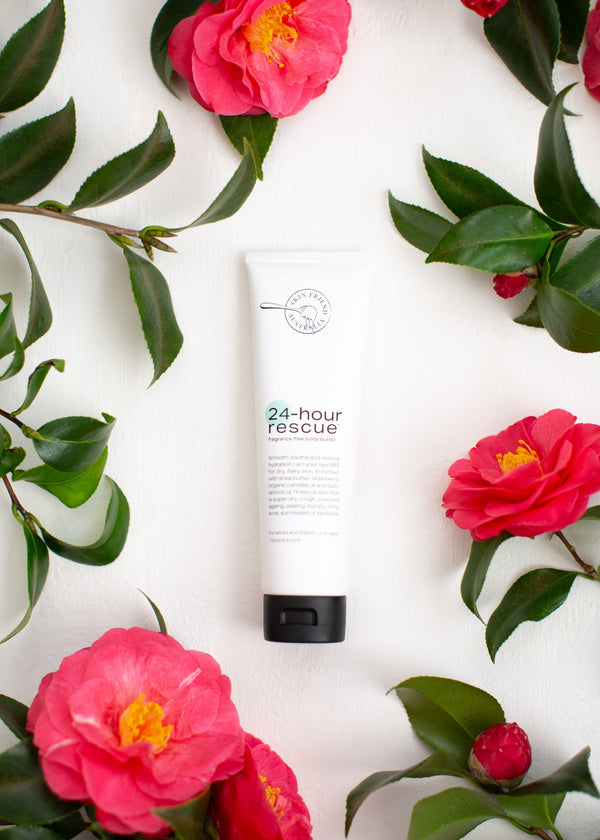
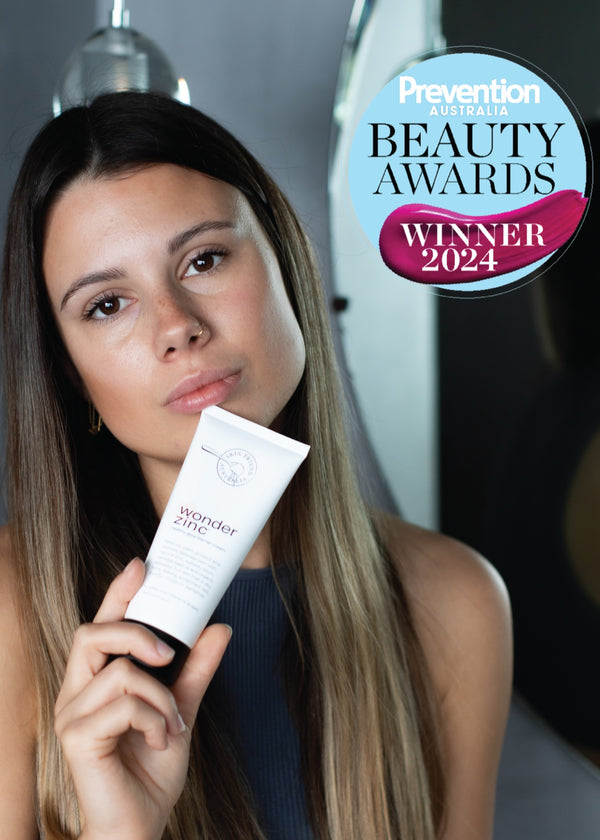
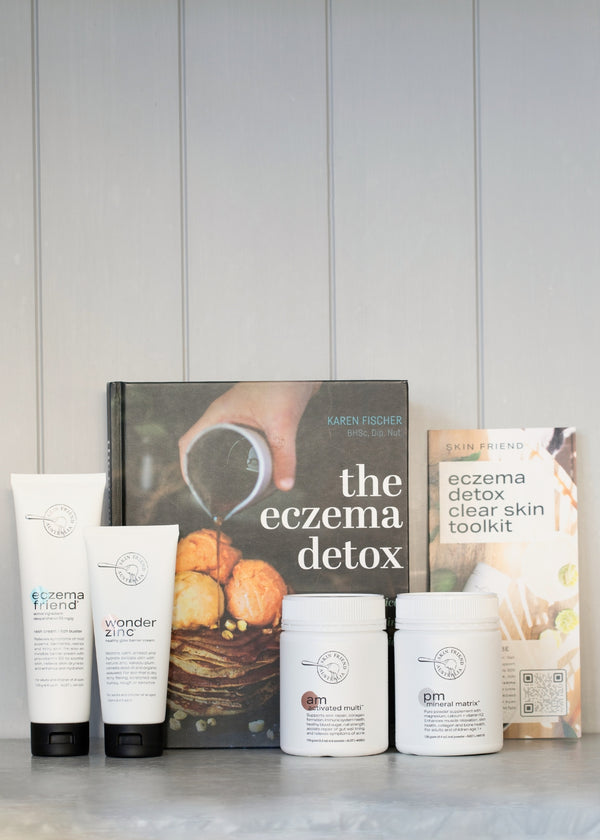
The Skin Friend Difference
At Skin Friend, we believe calm, healthy skin should be your everyday normal. Founded by award-winning nutritionist Karen Fischer, our products for eczema (on the face and all over the body) combine over 20 years of clinical experience with real eczema patients.
We provide clean beauty formulas that work. Every cream and supplement is designed to support your skin barrier, lock in moisture and work in harmony with your body.
Whether you’re struggling with seasonal eczema on the face or dandruff on the face and eyebrows, we take a prevention-focused approach that helps build skin resilience over time, so flare-ups are less likely to reoccur.
Choose Skin Friend for simple, science-backed care you can trust – for skin that looks and feels its best.
Explore Eczema by Body Area
- Eczema Around the Eyes and Eyelids
- Eczema on Hands and Fingers
- Eczema on Elbows and Knees
- Eczema on Feet and Ankles
- Eczema in Skin Folds (Intertrigo Areas)
Click for references
References:
-
National Eczema Association. (n.d.). Eczema.
- Brown SJ. Atopic eczema. Clin Med (Lond). 2016 Feb;16(1):66-69. doi: 10.7861/clinmedicine.16-1-66. PMID: 26833520; PMCID: PMC4954337.
- Christensen MO, et al. Prevalence of and association between atopic dermatitis and food sensitivity, food allergy and challenge-proven food allergy: A systematic review and meta-analysis. J Eur Acad Dermatol Venereol. 2023 May;37(5):984-1003. doi: 10.1111/jdv.18919. PMID: 36695076.
- Elias, PM., et al. (2002). Modulations in epidermal calcium regulate the expression of differentiation-specific markers. Journal of Investigative Dermatology, 119(5), pp.1128–1136.
- Eyerich K, Eyerich S, Biedermann T. The multi-modal immunopathogenesis of atopic eczema and its implications for targeted therapy. Allergy. 2010 Jul;65(7):834-47. doi: 10.1111/j.1398-9995.2010.02316.x. PMID: 20592880.
- Fischer, K., et al. (2025). Prevalence of Intolerance to Amines and Salicylates in Individuals with Atopic Dermatitis: A Systematic Review and Meta-Analysis. Nutrients, 17, 1628.
- Fivenson DP. The mechanisms of action of nicotinamide and zinc in inflammatory skin disease. Cutis. 2006 Jan;77(1 Suppl):5-10. PMID: 16871773.
- Lambers H, et al. Natural skin surface pH is on average below 5, which is beneficial for its resident flora. Int J Cosmet Sci. 2006 Oct;28(5):359-70. doi: 10.1111/j.1467-2494.2006.00344.x. PMID: 18489300.
- Leung DYM. New insights into atopic dermatitis: role of skin barrier and immune dysregulation. Allergol Int. 2013 Jun;62(2):151-161. doi: 10.2332/allergolint.13-RAI-0564. PMID: 23712284; PMCID: PMC8609663.
- Sharma V, et al. Zinc in dermatology: a review. Dermatol Res Pract. 2014;2014:709539. doi: 10.1155/2014/709539. PMID: 25477940; PMCID: PMC3656624.
- Simpson EL. Atopic dermatitis: a review of topical treatments. J Drugs Dermatol. 2006 Sep-Oct;5(7):704-11. PMID: 17124658; PMCID: PMC11894290.
- Zhu Z, et al. Assessment of the effectiveness of vitamin supplement in treating eczema: a systematic review and meta-analysis. Evid Based Complement Alternat Med. 2019 Oct 31;2019:6956034. doi: 10.1155/2019/6956034. PMID: 31781276; PMCID: PMC6875217.

